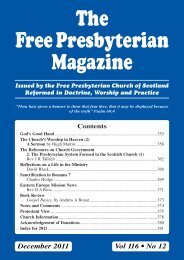March - the Free Presbyterian church of Scotland
March - the Free Presbyterian church of Scotland
March - the Free Presbyterian church of Scotland
You also want an ePaper? Increase the reach of your titles
YUMPU automatically turns print PDFs into web optimized ePapers that Google loves.
Book Reviews 87David C Searle’s abridgement <strong>of</strong> Calvin’s five-volume commentary on<strong>the</strong> Psalms is to be welcomed if it succeeds in attracting a wider circle <strong>of</strong>readers who would perhaps not o<strong>the</strong>rwise take up <strong>the</strong> full unabridged version.We find here <strong>the</strong> au<strong>the</strong>ntic voice <strong>of</strong> Calvin speaking with authority and faithfulnessto <strong>the</strong> plain teaching <strong>of</strong> <strong>the</strong> text. Searle has done his literary workwell in that regard. Yet in some ways it is a sad indication <strong>of</strong> <strong>the</strong> superficiality<strong>of</strong> <strong>the</strong> present state <strong>of</strong> religion that such an abridgement is deemednecessary, at least as far as preachers are concerned. As Searle himselfwrites in <strong>the</strong> Foreword, “During my years <strong>of</strong> ministry at Ru<strong>the</strong>rford House,I was <strong>of</strong>ten saddened by <strong>the</strong> realisation that few teachers and preachers <strong>of</strong><strong>the</strong> gospel ever used Calvin’s commentaries, ei<strong>the</strong>r on <strong>the</strong> Psalms or on <strong>the</strong>rest <strong>of</strong> <strong>the</strong> Christian Scriptures”.The Introduction contains a useful summary <strong>of</strong> Calvin’s method <strong>of</strong>interpretation and <strong>the</strong> leading doctrines he emphasises. Calvin referred to <strong>the</strong>Psalms as “an anatomy <strong>of</strong> all <strong>the</strong> parts <strong>of</strong> <strong>the</strong> soul” and we see his pastoralsensitivity in such comments as <strong>the</strong> following on Psalm 118:18: “We shouldalways recognise our adversities as coming from God’s hand to crucify oursinful natures . . . and humble us so that we might meditate on <strong>the</strong> heavenlylife. Those who champ impatiently on <strong>the</strong> bit do not see that <strong>the</strong>ir afflictionsare God’s rod administered in fa<strong>the</strong>rly care . . . He deals in mercy with Hispeople, that His chastening may serve as medicine and be <strong>the</strong>ir cure.”No doubt many useful passages have been omitted for <strong>the</strong> sake <strong>of</strong> condensationand it is to be regretted once again that <strong>the</strong> English Standard Versionis generally used for quotations. Never<strong>the</strong>less, this handy and attractive commentarywill prove useful to anyone desiring to get a lucid and brief overview<strong>of</strong> <strong>the</strong> contents <strong>of</strong> each <strong>of</strong> <strong>the</strong> Psalms and may lead <strong>the</strong>m on to study <strong>the</strong>unabridged version for <strong>the</strong>mselves.(Rev) A W MacCollWhen Christians Suffer, by Thomas Case, published by <strong>the</strong> Banner <strong>of</strong> TruthTrust in <strong>the</strong>ir Pocket Puritan series, paperback, 122 pages, £3.25.Case (1598–1682) was an English Puritan who suffered imprisonmentduring a time <strong>of</strong> political turmoil and believed that “discourses on afflictioncan never be out <strong>of</strong> season”. This little book has been reprinted, with editing,from his Treatise <strong>of</strong> Affliction (1652).Among Case’s “21 lessons which God usually teaches His people in asuffering condition” are: “self-denial and obedient submission to <strong>the</strong> will <strong>of</strong>God”, “more acquaintance with <strong>the</strong> Word <strong>of</strong> God”, and increase <strong>of</strong> grace.“Anything on this side <strong>of</strong> hell”, he writes, “is pure mercy.” And some finallessons include: “No man is blessed just because he is afflicted”; “If God hastaught you, as well as chastened you, you are a blessed man”; “Those whom
















